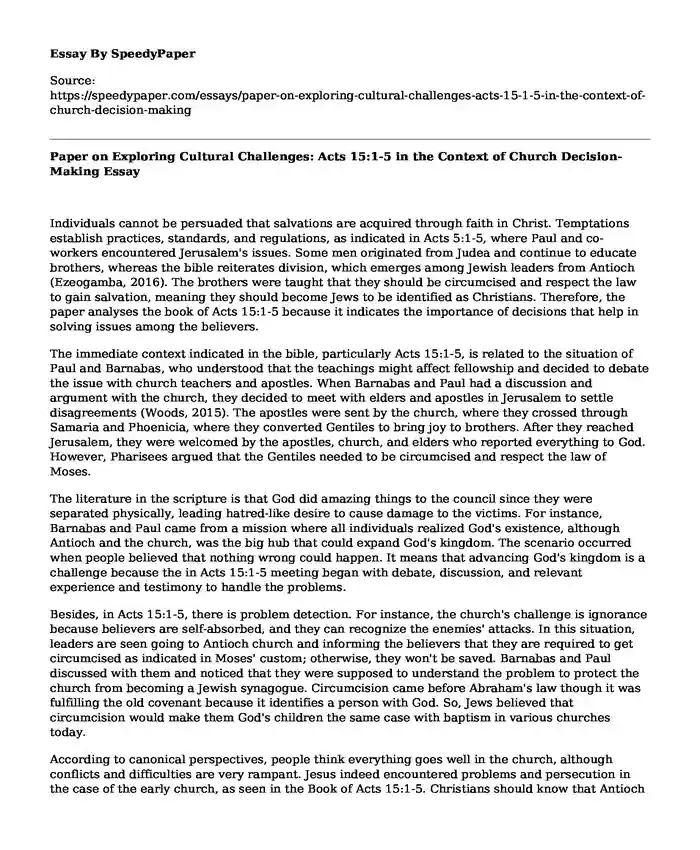Individuals cannot be persuaded that salvations are acquired through faith in Christ. Temptations establish practices, standards, and regulations, as indicated in Acts 5:1-5, where Paul and co-workers encountered Jerusalem's issues. Some men originated from Judea and continue to educate brothers, whereas the bible reiterates division, which emerges among Jewish leaders from Antioch (Ezeogamba, 2016). The brothers were taught that they should be circumcised and respect the law to gain salvation, meaning they should become Jews to be identified as Christians. Therefore, the paper analyses the book of Acts 15:1-5 because it indicates the importance of decisions that help in solving issues among the believers.
The immediate context indicated in the bible, particularly Acts 15:1-5, is related to the situation of Paul and Barnabas, who understood that the teachings might affect fellowship and decided to debate the issue with church teachers and apostles. When Barnabas and Paul had a discussion and argument with the church, they decided to meet with elders and apostles in Jerusalem to settle disagreements (Woods, 2015). The apostles were sent by the church, where they crossed through Samaria and Phoenicia, where they converted Gentiles to bring joy to brothers. After they reached Jerusalem, they were welcomed by the apostles, church, and elders who reported everything to God. However, Pharisees argued that the Gentiles needed to be circumcised and respect the law of Moses.
The literature in the scripture is that God did amazing things to the council since they were separated physically, leading hatred-like desire to cause damage to the victims. For instance, Barnabas and Paul came from a mission where all individuals realized God's existence, although Antioch and the church, was the big hub that could expand God's kingdom. The scenario occurred when people believed that nothing wrong could happen. It means that advancing God's kingdom is a challenge because the in Acts 15:1-5 meeting began with debate, discussion, and relevant experience and testimony to handle the problems.
Besides, in Acts 15:1-5, there is problem detection. For instance, the church's challenge is ignorance because believers are self-absorbed, and they can recognize the enemies' attacks. In this situation, leaders are seen going to Antioch church and informing the believers that they are required to get circumcised as indicated in Moses' custom; otherwise, they won't be saved. Barnabas and Paul discussed with them and noticed that they were supposed to understand the problem to protect the church from becoming a Jewish synagogue. Circumcision came before Abraham's law though it was fulfilling the old covenant because it identifies a person with God. So, Jews believed that circumcision would make them God's children the same case with baptism in various churches today.
According to canonical perspectives, people think everything goes well in the church, although conflicts and difficulties are very rampant. Jesus indeed encountered problems and persecution in the case of the early church, as seen in the Book of Acts 15:1-5. Christians should know that Antioch Syria's church expansion started when the believers left their land and homes. For example, Paul and Barnabas moved to the south to look at church leaders in Jerusalem to announce God's work as they feared false teachings. They mentioned what was happening during Antioch's missionary journey, where several Gentiles and Jews decided to accept God in their heart.
Conclusion
Finally, cultural problems are seen through Acts 15:1-5, especially from Pharisees, who believed in Christ, although they offered false teachings. They indicated that Gentiles were required to get circumcised and follow Moses' law (Sleeman, 2017). However, this chapter applies to contemporary society because various churches are adhering to the world's philosophers to guide them towards God's work rather than the bible. Thus, from this chapter, the church should rely on the bible to guide them spiritually rather than the religious books written by great scholars because they may mislead them. So, every individual should make vital decisions like the Jerusalem council since salvation is by grace.
References
Ezeogamba, A. I. (2016). Harmonious Resolution of Controversy (Acts 15: 1-35) Panacea for Integral Development of Any Society. 5-145. https://www.researchgate.net/publication/332171603_Harmonious_Resolution_of_Controversy_Acts_151-35_Panacea_for_Integral_Development_of_Any_Society
Sleeman, M. (2017). Paul, Pentecost, and the Noosphere: The Final Return to Jerusalem in the Acts of the Apostles. The Urban World and the First Christians, 20-41.
Woods, D. (2015). Does Acts 15: 9 refute intra-ecclesial Jew-Gentile distinction. Conspectus: The Journal of the South African Theological Seminary, 19(03), 10. https://hdl.handle.net/10520/EJC170478
Cite this page
Paper on Exploring Cultural Challenges: Acts 15:1-5 in the Context of Church Decision-Making. (2023, Dec 11). Retrieved from https://speedypaper.com/essays/paper-on-exploring-cultural-challenges-acts-15-1-5-in-the-context-of-church-decision-making
Request Removal
If you are the original author of this essay and no longer wish to have it published on the SpeedyPaper website, please click below to request its removal:
- What Really Matters? Free Essay on Volunteering
- Parenthood in the Modern Church - Free Essay with the Articles Review
- Crusades and Islamic Sicily, Free Annotated Bibliography Sample
- Free Essay Sample on Teaching Diverse Learners
- Free Essay: Reformational View of Vocation
- Essay Sample on Beowulf: The Battle with Grendel
- Essay Example: How My View of Theology Has Changed
Popular categories





